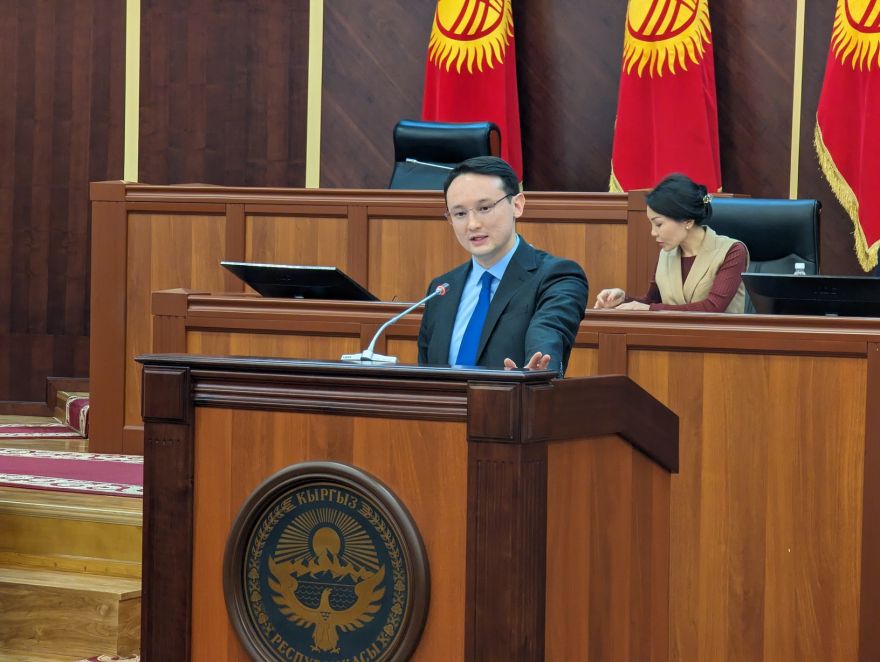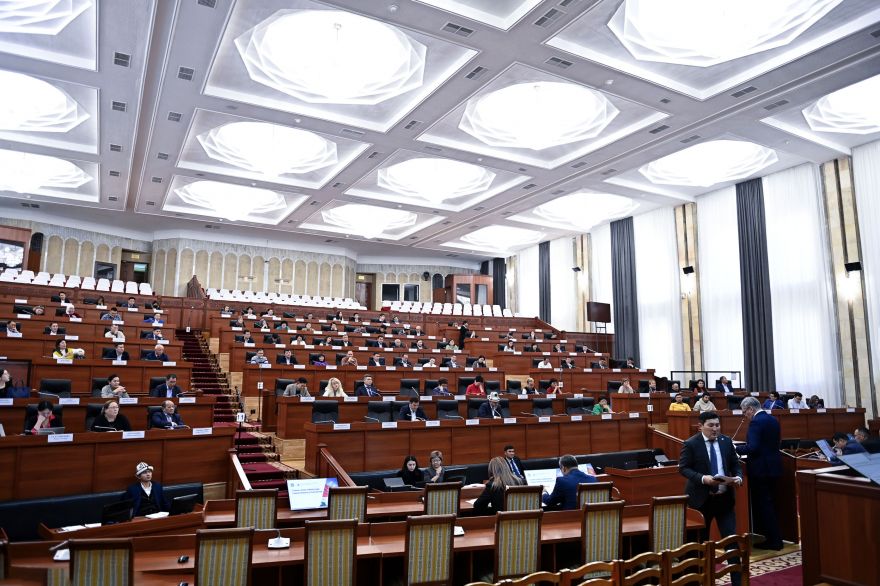News /
IBC news /
IBC voices its comments and proposals to tax legislation in Parliament
Representatives of business associations took part in parliamentary hearings on the draft law "On amendments to certain legislative acts in the field of taxation", held on December 20 in the Jogorku Kenesh of the Kyrgyz Republic.
According to the initiators, the bill provides for measures aimed at creating a favorable climate for business entities, and is also aimed at creating conditions for fair competition and reducing the shadow economy.
“This massive bill contains a number of amendments necessary for business, and we have been working on them together with the Economy Ministry throughout the year,” said Askar Sydykov, Executive Director of the International Business Council, at the hearing.

Among the advantages are such norms as the reduction of single tax rates for public catering enterprises, the IT, the creative and the tourism industries, the reduction of fines in case of violation of the requirements for the use of cash registers, the extension for a year of the zero sales tax rate in case of cashless payments, and others.
“However, it is necessary to note the comments and suggestions that were not taken into account and which are fundamental,” added the IBC head and listed some of them.
E-invoices, beverage excises, green incentives
IBC proposes to amend the Tax Code version developed by the Economy Ministry, where the responsibility for issuing electronic invoices is provided for those who buy it. It is more expedient to impose responsibility and sanctions on those who has not issued e-invoices, that is, on the sellers.
Once again, the issue of excise taxes on sugar-containing drinks was raised. Business is against this initiative. But if it still remains, then it is necessary to reduce excise rates on these types of drinks as soon as possible by issuing by-laws. And to adopt a national classifier, in which tonic drinks will be separated from other sugar-containing drinks.
Another issue is related to the development of the green economy. The proposal to exempt VAT on the supply (sale) of electric vehicles and charging equipment for them is a good government initiative (now only imports are exempt). But at the same time, business proposes to speed up the process of adopting a list of VAT-exempt technologies and equipment that promote the introduction of green technologies.
With the introduction of the current version of the Tax Code of the Kyrgyz Republic, norms were adopted to exempt from VAT on the supply and import of technologies, equipment and its components that meet the requirements of energy and resource efficiency. These norms were adopted on the recommendation of many organizations working in the field of green technologies.
However, by-laws for the implementation of these norms of the Tax Code have not yet been adopted. One of the reasons is that the article provides for the adoption by the Cabinet of Ministers of two regulatory legal acts (RLA). One RLA defines the requirements for energy and resource efficiency, and the other approves the list of technologies, equipment and components that meet these requirements.
There is no need to adopt the first NLA, since its requirements are reflected in standardization documents. It is proposed to leave only the norm providing for the approval of the list of technologies.
Reverse VAT credit
Despite repeated appeals from IBC and other associations, a gap in the Tax Code has not been eliminated – there is still no mechanism for offsetting VAT paid by a tax agent (reverse VAT).
The current version of the Tax Code does not contain a rule for regulating tax legal relations when refunding reverse VAT on purchased works and services, the place of delivery of which is the territory of the Kyrgyz Republic.
Taxation of subsoil users
Among the issues related to the taxation of subsoil users, business is concerned about the application of a tax on income from the extraction of certain metals. The bill proposes instead of the current income tax, by analogy with the tax on gold, to tax income from the extraction of copper, silver, mercury, antimony, tungsten, and tin.
This initiative is inappropriate, since, in comparison with the gold mining industry, the infrastructure for processing such metals is not developed. Taxation at the proposed rates (for example, at least 8% of the proceeds from ores of silver, copper and at least 3% of the proceeds of finished products) casts doubt on the profitability of mining the mentioned metals.
An additional financial burden for companies may also be the expansion of the tax base for royalties. As a tax base for minerals (except for gold, platinum and silver), the MPs propose to use not the cost of minerals before they are processed, but the proceeds from the sale of finished products.
Business also believes that an addition should be made to the current Tax Code on the application of a zero VAT for exports of metal-containing ores, concentrates, alloys and refined metals to the EAEU countries.
Bank secrecy violation
The draft law proposes to abolish banking secrecy and provide information on transactions on the accounts of taxpayers being audited to the tax authorities without a court decision.
The proposed changes will have a negative impact on all taxpayers in the country. Such changes will allow tax authorities and their representatives to receive information from banks on the status of bank accounts of any legal entities and individuals, citizens of the Kyrgyz Republic without a court decision and any restrictions.
One of the banks' main principles is to protect the rights and interests of their clients who have entrusted their own savings, personal data, movable and immovable property and other information to the bank, relying that all transferred funds and information are under the protection guaranteed by the Constitution.
One of the key bank principles is to protect the rights and interests of their. The loss of banking secrecy can undermine confidence in the banking system, lead to an outflow of deposits, a decrease in the share of non-cash payments, and as a result, to a slowdown in economic growth and an increase in shadow turnover.
The banking sector believes that the proposed changes to the Tax Code are contrary to the Constitution, according to which any actions related to the property of citizens in their ownership are allowed only on the basis of a court decision.
Deduction of interest expenses of banks
In many countries, interest income and expenses of banks are taxed on an accrual basis rather than on a cash basis. Taxation of interest expenses of banks on a cash basis (paid interest) is contrary to world practice, including the EAEU countries. For example, in Russia, Kazakhstan and Belarus, accrued interest expenses are deducted, but not paid.
The question arises of the advisability of introducing this change in 2021 for all taxpayers. If this is due to a small number of dishonest taxpayers who entered into fictitious loan agreements (accrued expenses, deducted them, but did not pay interest). The cash basis should have been applied to such dishonest taxpayers, but not to the entire banking sector.
For banks, the accrual of interest income and expenses is the main activity, and the taxation of interest expenses on a cash basis can lead to a decrease in the taxable base, which is contrary to the interests of the state.




























